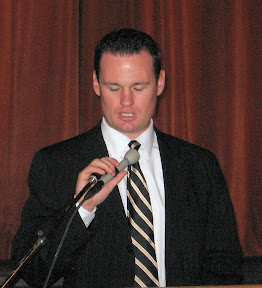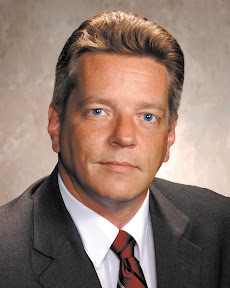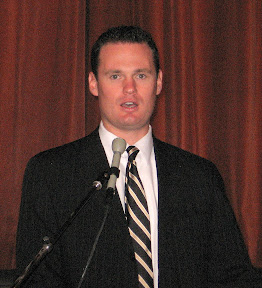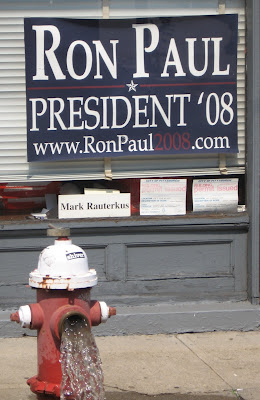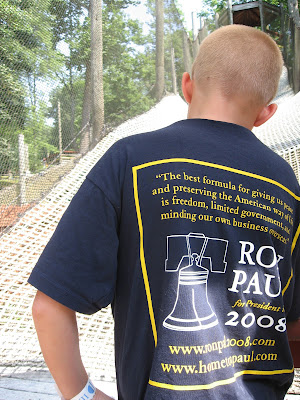On July 7, 2005, the Pennsylvania General Assembly passed a bill providing pay raises for all three branches of government. The bill was passed at 2:00 a.m. with no public input and was an example of 'gut-and-run' legislation, in which a one-page bill was stripped of all text, replaced with a 22-page amendment in a conference committee and quickly passed without debate.
The bill contained a non-severability clause, meaning that if any portion was struck down in court, the entire pay raise would be struck down as well. This was an attempt to insure against any future lawsuits against the pay raise bill. In practice, if any single judge ruled against any part of the bill, every judge, legislator and executive branch member who received a pay raise would lose it.
What judge in their right mind would want to jeopardize the pay raise of every one of his or her colleagues? All for one and one for all.
By his own admission, Chief Justice of the Supreme Court Ralph Cappy was a chief proponent of the pay raise package and claimed the legislature showed "courage" in passing it. He also met privately with members of the other two branches of government to hammer out the details.
The bill did not adhere to the Constitution's 'original purpose' or 'three day' rules. Just weeks earlier, however, the Supreme Court sent a clear message to the legislature that such a bastardized process was acceptable in the Court's eyes - via a decision on a case regarding the bill that created the Commonwealth's slots industry, which was passed in much the same manner.
The public was outraged by the pay raise. Activist Gene Stilp filed suit against the bill and its clear violations of constitutional provisions for the legislative process. A four-month public outcry eventually led to a repeal of the pay raise by the General Assembly on November 16, 2006.
The pay raise repeal also included a non-severability clause, meaning that if any court struck down any small portion of the repeal, everyone would get their raises back. In for a penny, in for a pound.
Since the pay raise was repealed, Commonwealth Court dismissed Stilp's suit as moot. Two subsequent suits were filed by judges against the repeal, however. These cases revolved around the constitutional provision that judicial salaries cannot be cut unless the salaries of "all salaried officers of the Commonwealth" are also reduced.
There is no definition within the Constitution of what a "salaried officer" is. Short of a constitutional definition of the term, an act of the General Assembly is the next best thing - so the legislature created a definition within the repeal specifically to prevent court challenges based on this point.
While the Stilp case dealt with the procedural issues involved with the pay raise, the judges' cases against the repeal only sought to keep the money. In an extraordinary move, the Supreme Court used its King's Bench power to pull the two cases filed by judges directly to the high court for adjudication. In an even more unusual move, the Court brought the Stilp case back from the dead so they could rule on all the pay raise issues at once.
The case took an even more bizarre twist in January 2006 when state Treasurer Bob Casey, Jr. - who was named as a respondent in the both the Stilp case and one of the judges' cases - filed an amici curiae (friend of the court) brief siding with plaintiff Stilp. A similar brief supporting Stilp's procedural arguments was filed by activists Tim Potts, Eric Epstein and Russ Diamond.
Many Pennsylvanians quietly opined that the "fix was in" as soon as the Court decided to use its King's Bench power to combine the three cases into one. Because the salary of every single judge in the state was at stake, conflict of interest issues abounded. What state court could possibly give this case a fair hearing?
Oral arguments were heard on April 4, 2006, in Philadelphia and the Court handed down its opinion on September 14, 2006. The decision came as no real surprise, but Pennsylvanians were outraged nonetheless.
The Pennsylvania Supreme Court combined three separate cases - including one that was already DOA - in order to cherry-pick pieces from each to build a decision that would allow all judges in the Commonwealth to keep the loot. It was an act of legal gymnastics the likes of which no Pennsylvanian had ever seen.
Despite the non-severability clause in the repeal, the Court restored pay raises for the judicial branch only. The legislative procedural issues of the Stilp case were not resolved.
"This was a judicial swindle," Duquesne University Law School professor Bruce Ledewitz told the Pittsburgh Post-Gazette. "They went out of their way to uphold every other part of the constitutional challenge except the part that would have affected their own pay raises." Ledewitz later stated it was only the second time in American history a non-severability clause was ignored by a court.
Justice Ronald Castille, author of the Court's majority opinion, later wrote a letter to Duquesne University Law School that arguably threatened to bring Ledewitz up for disciplinary action due to his comments. With Ralph Cappy's recent resignation, Castille is due to become the Chief Justice of the Supreme Court in 2008.
Every single member of Pennsylvania's judicial branch now benefits from this judicial swindle. When they want to talk about "their record," they must first explain how they justify keeping the loot from what many non-judge and non-lawyer Pennsylvanians consider to be a disgraceful act of self-service.
Just because it has been deemed "legal" doesn't make it right. After all, how was it deemed "legal" in the first place? That's right - judges pushed for a pay raise, the top judge held secret meetings behind closed doors to get it, judges filed the challenges to the repeal and judges made the final "legal" decision.
Judges may decide the law, but We the People decide who the judges are.
What YOU Need to Do on November 6
PACleanSweep Judicial Retention Poll Results
Pennsylvania's Judicial Retention System
About PACleanSweepPACleanSweep is a non-partisan effort dedicated to reforming state government in Pennsylvania. For more information, please visit www.PACleanSweep.com.
| For more information: Russ Diamond, Chair 717.383.3025 |




